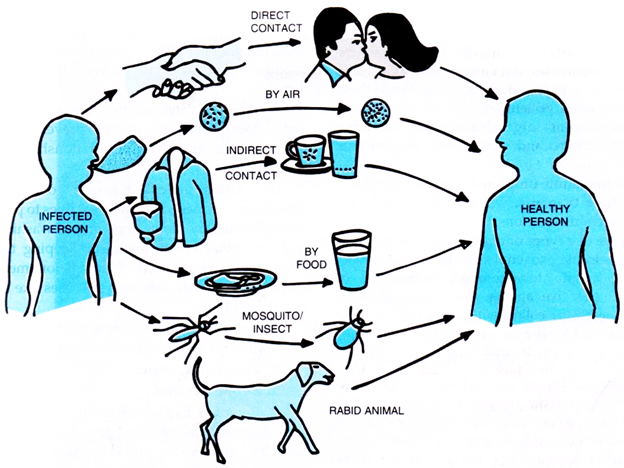Communicable Disease Control
Click here to view the Infectious Disease Isolation Guidance
Click here to view the Respiratory Infection Guidance
Communicable Diseases
Communicable diseases, also known as infectious or transmissible diseases, are illnesses that can be spread from one person to another or from an animal to a person. Pathogens like viruses, bacteria, and fungi cause these diseases. The spread of disease can happen through multiple ways including air, blood or bodily fluids, food, and water. The terms contagious and infectious are also used to describe communicable diseases. Contagious diseases are spread through contact; infectious diseases are spread by infectious agents, such as bacteria and viruses. While all contagious diseases are infectious, not all infectious diseases are contagious. For example, some foodborne illnesses are not able to be spread from one person to another, hence they are infectious but not contagious.

Communicable Disease Surveillance
Communicable disease surveillance is a multi-component system for monitoring the emergence and spread of contagious diseases. The data that this system monitors and analyzes includes, but is not limited to, demographic, geographic, and disease/condition-specific information. Accurate identification and timely reporting are key parts of successful disease control, and they enable public health agencies to:
- Identify contacts who may be infected or other individuals at risk for infection.
- Determine the incidence and prevalence of disease in a specific area of the state.
- Assist hospitals and physicians in evaluating illnesses in their patients and communities.
- Assist the public in making better decisions regarding health and lifestyle.
With the right information, the Centers for Disease Control (CDC) and public health professionals can take timely and effective actions to save lives and keep Americans safe.
Examples of Communicable Diseases
Mosquito Borne Illnesses:
Tick borne illnesses:
Other communicable diseases:
- Influenza
- Measles
- MRSA
- Legionella
- Bacterial Meningitis
- Viral Meningitis
- Scabies
- Norovirus
- Pertussis
- Ebola
- Mumps
- Tuberculosis
- Rabies
Rabies Prevention
While rabies is 100% fatal, it is also 100% preventable. Simple precautions are all it takes to ensure you do not have to undergo costly treatments or euthanize your pet. Here are some ways you can avoid rabies:
Avoid Wild Animals
- Don’t try to help a sick or injured animal on your own – contact authorities to handle these situations.
- Don’t try to pet a seemingly friendly wild animal – leave them be!
- Don’t feed wild animals or encourage them in any way to come close to your or near your home.
- Keep pets secured and unable to mingle with wildlife.
Vaccinate Your Pets
- It’s required for all domestic animals in city limits in most, if not all, cities in Kansas to be vaccinated against rabies
- Rabies vaccine must be administered by a licensed veterinarian.
- Keep copies of rabies vaccination records
Leave Strays Alone
- If you’re concerned a stray animal may be injured, contact local authorities (animal control)
- If you have a stray (or an abundance of strays), contact animal control to catch and remove the animals.
- Don’t allow your children to play with stray kittens or puppies – they can be carrying disease as well as fleas, ticks, and lice.
Spay and/or Neuter Your Pets
- Limit unwanted pet population and potential rabies risks by spaying or neutering your pets.
- Pets who have been spayed or neutered are less likely to wander or fight with strays who could be infected.
If you suspect that you may have been exposed to rabies, contact the Kansas Department of Health & Environment's (KDHE) Epidemiology Hotline at (877) 427-7317. To determine if you need to begin post-exposure prophylaxis, click here to access KDHE's Rabies Exposure Assessment tool.
For Law Enforcement Professionals, Animal Control Officers, or Clinicians, click here to access our Animal Bite Report Form.
For more information about rabies and state recommendations, click here to visit KDHE's rabies webpage.

